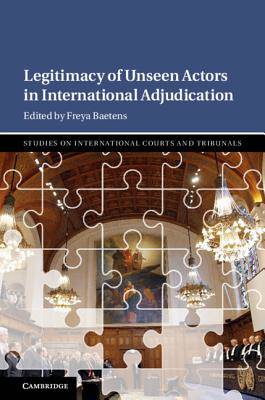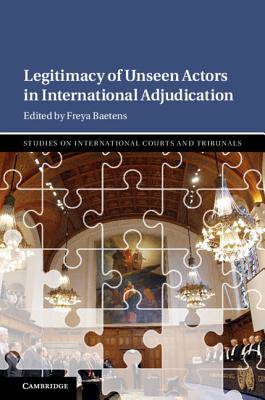
Bedankt voor het vertrouwen het afgelopen jaar! Om jou te bedanken bieden we GRATIS verzending (in België) aan op alles gedurende de hele maand januari.
- Afhalen na 1 uur in een winkel met voorraad
- In januari gratis thuislevering in België
- Ruim aanbod met 7 miljoen producten
Bedankt voor het vertrouwen het afgelopen jaar! Om jou te bedanken bieden we GRATIS verzending (in België) aan op alles gedurende de hele maand januari.
- Afhalen na 1 uur in een winkel met voorraad
- In januari gratis thuislevering in België
- Ruim aanbod met 7 miljoen producten
Zoeken
Legitimacy of Unseen Actors in International Adjudication
€ 275,45
+ 550 punten
Omschrijving
International courts and tribunals differ in their institutional composition and functions, but a shared characteristic is their reliance on the contribution of individuals other than the judicial decision-makers themselves. Such 'unseen actors' may take the form of registrars and legal officers, but also non-lawyers such as translators and scientific experts. Unseen actors are vital to the functioning of international adjudication, exerting varying levels of influence on judicial processes and outcomes. The opaqueness of their roles, combined with the significance of judicial decisions for the parties involved as well as a wider range of stakeholders, raises questions about unseen actors' impact on the legitimacy of international dispute settlement. This book aims to answer such legitimacy questions and identify 'best practices' through a multifaceted enquiry into common connections and patterns in the institutional composition and daily practice of international courts and tribunals.
Specificaties
Betrokkenen
- Uitgeverij:
Inhoud
- Aantal bladzijden:
- 650
- Taal:
- Engels
- Reeks:
Eigenschappen
- Productcode (EAN):
- 9781108485852
- Verschijningsdatum:
- 3/10/2019
- Uitvoering:
- Hardcover
- Formaat:
- Genaaid
- Afmetingen:
- 182 mm x 229 mm
- Gewicht:
- 1043 g

Alleen bij Standaard Boekhandel
+ 550 punten op je klantenkaart van Standaard Boekhandel
Beoordelingen
We publiceren alleen reviews die voldoen aan de voorwaarden voor reviews. Bekijk onze voorwaarden voor reviews.








